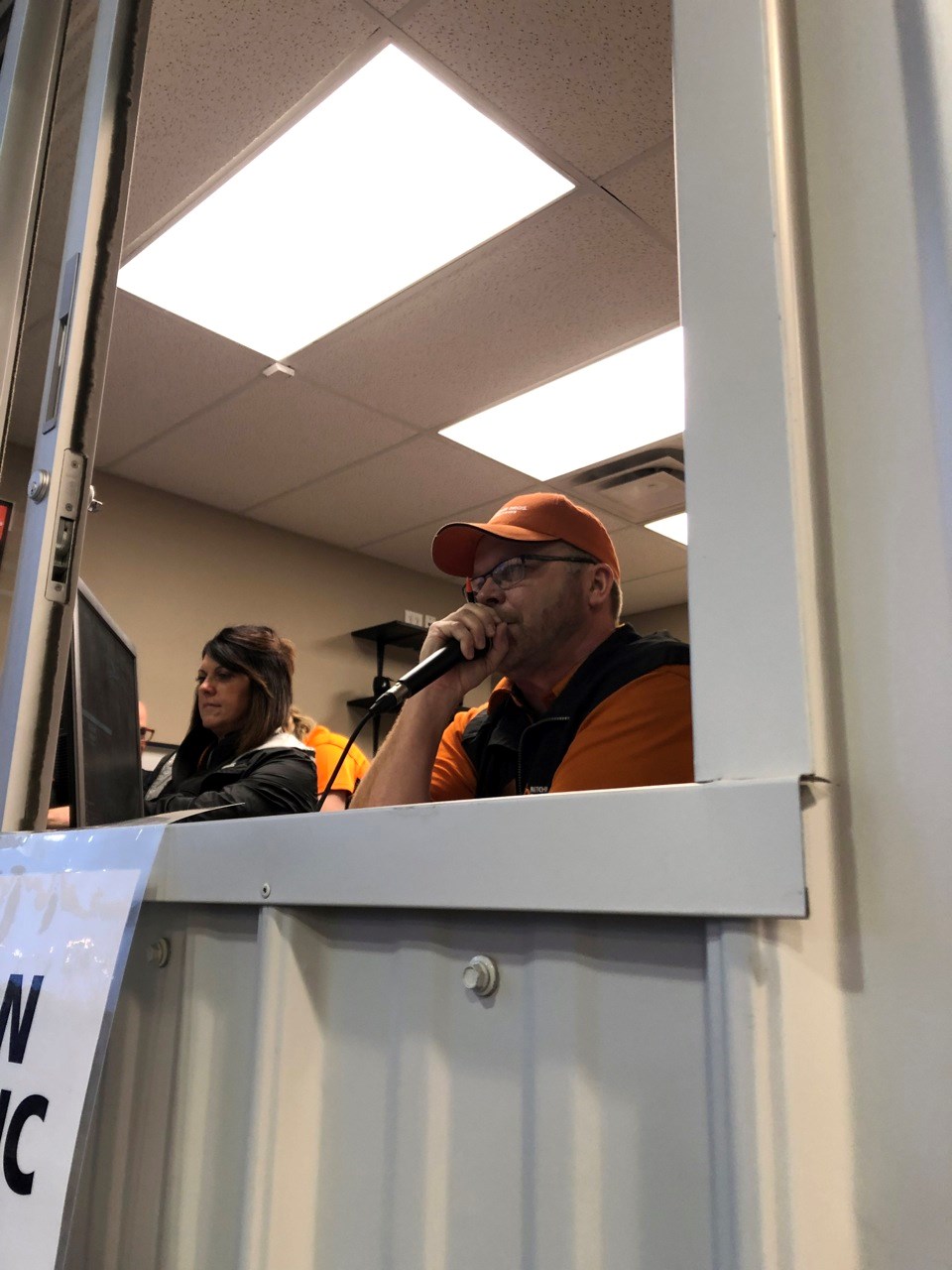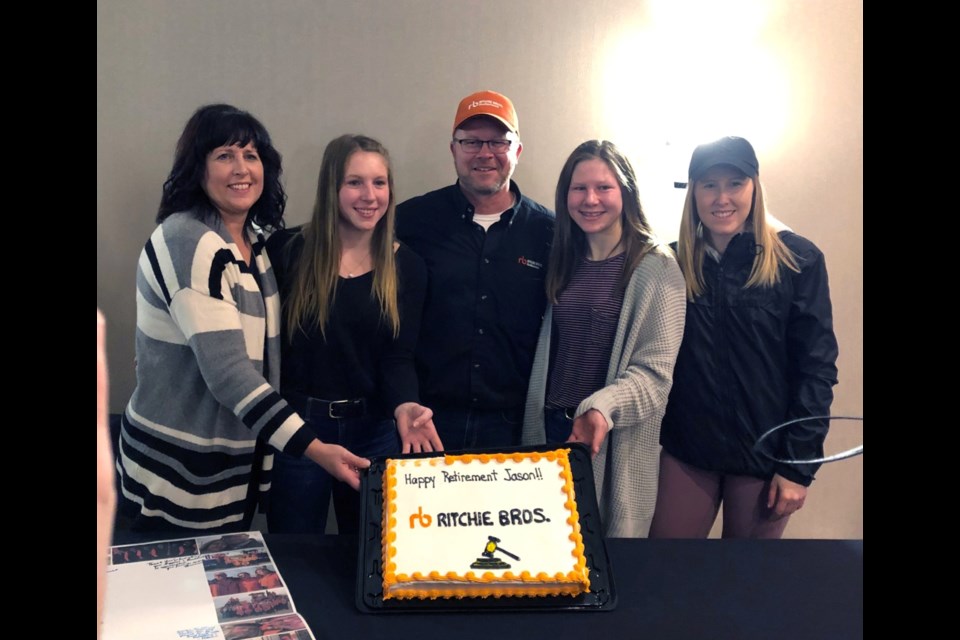Jason LeBlanc doesnŌĆÖt know for certain if he has brought down the gavel and said ŌĆ£Sold!ŌĆØ for the final time, but auctioneering isnŌĆÖt going to be as big of a part of his life as it once was.
LeBlanc conducted a Ritchie Bros. auction for the last time Dec. 5 in Saskatoon. There was a large crowd, and many of them were there to offer him their fondest wishes as he closes this chapter of his life.
He cited his family and his farm near Outram as reasons to step away from the auctioneering business. But that doesnŌĆÖt change his belief that Ritchie Bros. is a great company to work for.
ŌĆ£ItŌĆÖs the worldŌĆÖs largest auction company,ŌĆØ he told the Mercury. ŌĆ£They took us around the world at different continents and different countries, and itŌĆÖs been a great ride.ŌĆØ
LeBlanc selected the Dec. 5 auction to be his last with Ritchie Bros. because it was close to the 30-year anniversary of his first auction on Dec. 15, 1989.
ŌĆ£It was the first time I ever legally said the word ŌĆśSold,ŌĆÖŌĆØ he recalled. ŌĆ£It was just as close to the two dates as I could possibly get.ŌĆØ
The last item he sold was a 15-foot, $300 cultivator.
The location was also sentimental, as the Saskatoon yard site was also one of his first for Ritchie Bros.
A reception was held after the Dec. 5 auction to mark the end of LeBlancŌĆÖs tenure with the company. Many auctioneers he has sold with over the years, from all kinds of companies, came out to be there with him. Some were people he hadnŌĆÖt seen for years; others flew into Saskatoon for the celebration.┬Ā

LeBlanc grew up working in the back of an auction mart, thanks to his familyŌĆÖs involvement in the cattle business. When he graduated from Grade 12, he thought he would become a welder.
ŌĆ£Sometime throughout the summer, I met a guy named Otto Streberg who was putting on an auction school, and he happened to be in Estevan,ŌĆØ said LeBlanc. ŌĆ£I ran into him and met him, and another local guy, Donnie Hilstrom, he was going to take this auction course, and they asked me if IŌĆÖd be interested in something like that. I never once thought of even ąĪ└Č╩ėŲĄ an auctioneer.ŌĆØ
He used the money from the sale of his 4-H steer that year, and $1,000 from his mother, to go to auction school, and he graduated in December 1989.
Eventually he started the LeBlanc Auction Service, and sold it to Ritchie Bros. in 2004.
ŌĆ£When I first met with Ritchie Bros., they werenŌĆÖt even in the ag. business. They were just getting started. I was very fortunate to be on the ground floor, and to take the agriculture knowledge that I gained and basically sold it to Ritchie Bros., and I was able to be instrumental in developing agricultural auctions within that company.ŌĆØ
Serving as an auctioneer allowed him to travel the world and meet new people, and itŌĆÖs the interactions with others that he enjoyed the most.
ŌĆ£My favourite part of the auction business, out of all of the stuff that IŌĆÖve sold over the years, and thereŌĆÖs been multitudes ŌĆō from cattle to antiques to major lines of equipment, airplanes, land ŌĆō but my heart is with the farms, the farm sales, the farm retirements and the dispersals.ŌĆØ
He would get to know the families during the final months on the farm.
ŌĆ£We had so many tight bonds, and thatŌĆÖs what I like, and IŌĆÖm going to miss that part of it.ŌĆØ
He kept a copy of every sale he conducted, and he has a couple thousand sale posters to look at.
ŌĆ£I have a memory from each one of them,ŌĆØ LeBlanc said.
People like Del Godman from DelŌĆÖs Commercial Printing and John Empey were a big help early in his career. The Symons family from the Beefeater co-signed his bond, and his parents helped him out.┬Ā
LeBlanc might conduct an occasional auction, but the days of living on a schedule and travelling as an auctioneer are finished.
ŌĆ£IŌĆÖm just coming home. I want to farm a little bit with my family and spend some time with my dad, and do that type of thing.ŌĆØ
It was difficult balancing farming, family and auctioneering. His wife Sherrill looked after the kids and the home when he was gone, and his hired hand, Jake Fast, did a lot of work on the farm, too.
ŌĆ£The balancing act, it does get a little trickier at times, especially when youŌĆÖre gone into faraway places. ItŌĆÖs not bad if youŌĆÖre within a day of ąĪ└Č╩ėŲĄ at home, but when youŌĆÖre gone on a long journey somewhere, or gone into the States, it just becomes a little tougher all the time,ŌĆØ said LeBlanc. ŌĆ£I want to be home before all of the kids are gone, and be around a little more.ŌĆØ┬Ā




